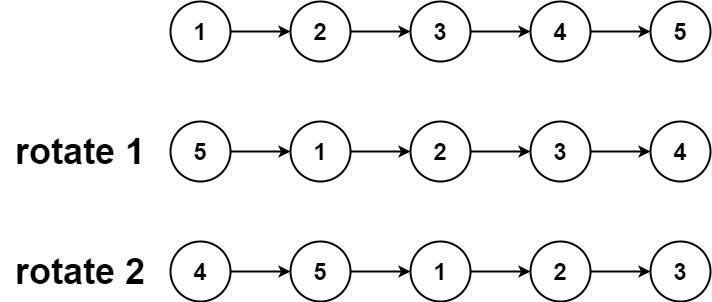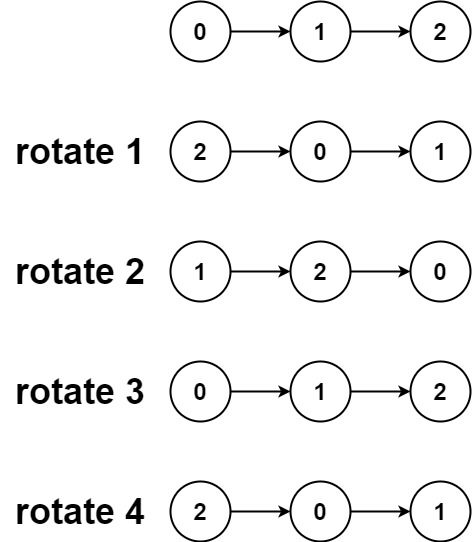| comments | difficulty | edit_url | tags | ||
|---|---|---|---|---|---|
true |
Medium |
|
Given the head of a linked list, rotate the list to the right by k places.
Example 1:
Input: head = [1,2,3,4,5], k = 2 Output: [4,5,1,2,3]
Example 2:
Input: head = [0,1,2], k = 4 Output: [2,0,1]
Constraints:
- The number of nodes in the list is in the range
[0, 500]. -100 <= Node.val <= 1000 <= k <= 2 * 109
First, we check whether the number of nodes in the linked list is less than
Otherwise, we first count the number of nodes
If the effective value of
Otherwise, we use fast and slow pointers, let the fast pointer move
Finally, we concatenate the linked list.
The time complexity is
# Definition for singly-linked list.
# class ListNode:
# def __init__(self, val=0, next=None):
# self.val = val
# self.next = next
class Solution:
def rotateRight(self, head: Optional[ListNode], k: int) -> Optional[ListNode]:
if head is None or head.next is None:
return head
cur, n = head, 0
while cur:
n += 1
cur = cur.next
k %= n
if k == 0:
return head
fast = slow = head
for _ in range(k):
fast = fast.next
while fast.next:
fast, slow = fast.next, slow.next
ans = slow.next
slow.next = None
fast.next = head
return ans/**
* Definition for singly-linked list.
* public class ListNode {
* int val;
* ListNode next;
* ListNode() {}
* ListNode(int val) { this.val = val; }
* ListNode(int val, ListNode next) { this.val = val; this.next = next; }
* }
*/
class Solution {
public ListNode rotateRight(ListNode head, int k) {
if (head == null || head.next == null) {
return head;
}
ListNode cur = head;
int n = 0;
for (; cur != null; cur = cur.next) {
n++;
}
k %= n;
if (k == 0) {
return head;
}
ListNode fast = head;
ListNode slow = head;
while (k-- > 0) {
fast = fast.next;
}
while (fast.next != null) {
fast = fast.next;
slow = slow.next;
}
ListNode ans = slow.next;
slow.next = null;
fast.next = head;
return ans;
}
}/**
* Definition for singly-linked list.
* struct ListNode {
* int val;
* ListNode *next;
* ListNode() : val(0), next(nullptr) {}
* ListNode(int x) : val(x), next(nullptr) {}
* ListNode(int x, ListNode *next) : val(x), next(next) {}
* };
*/
class Solution {
public:
ListNode* rotateRight(ListNode* head, int k) {
if (!head || !head->next) {
return head;
}
ListNode* cur = head;
int n = 0;
while (cur) {
++n;
cur = cur->next;
}
k %= n;
if (k == 0) {
return head;
}
ListNode* fast = head;
ListNode* slow = head;
while (k--) {
fast = fast->next;
}
while (fast->next) {
fast = fast->next;
slow = slow->next;
}
ListNode* ans = slow->next;
slow->next = nullptr;
fast->next = head;
return ans;
}
};/**
* Definition for singly-linked list.
* type ListNode struct {
* Val int
* Next *ListNode
* }
*/
func rotateRight(head *ListNode, k int) *ListNode {
if head == nil || head.Next == nil {
return head
}
cur := head
n := 0
for cur != nil {
cur = cur.Next
n++
}
k %= n
if k == 0 {
return head
}
fast, slow := head, head
for i := 0; i < k; i++ {
fast = fast.Next
}
for fast.Next != nil {
fast = fast.Next
slow = slow.Next
}
ans := slow.Next
slow.Next = nil
fast.Next = head
return ans
}/**
* Definition for singly-linked list.
* class ListNode {
* val: number
* next: ListNode | null
* constructor(val?: number, next?: ListNode | null) {
* this.val = (val===undefined ? 0 : val)
* this.next = (next===undefined ? null : next)
* }
* }
*/
function rotateRight(head: ListNode | null, k: number): ListNode | null {
if (!head || !head.next) {
return head;
}
let cur = head;
let n = 0;
while (cur) {
cur = cur.next;
++n;
}
k %= n;
if (k === 0) {
return head;
}
let fast = head;
let slow = head;
while (k--) {
fast = fast.next;
}
while (fast.next) {
fast = fast.next;
slow = slow.next;
}
const ans = slow.next;
slow.next = null;
fast.next = head;
return ans;
}// Definition for singly-linked list.
// #[derive(PartialEq, Eq, Clone, Debug)]
// pub struct ListNode {
// pub val: i32,
// pub next: Option<Box<ListNode>>
// }
//
// impl ListNode {
// #[inline]
// fn new(val: i32) -> Self {
// ListNode {
// next: None,
// val
// }
// }
// }
impl Solution {
pub fn rotate_right(mut head: Option<Box<ListNode>>, mut k: i32) -> Option<Box<ListNode>> {
if head.is_none() || k == 0 {
return head;
}
let n = {
let mut cur = &head;
let mut res = 0;
while cur.is_some() {
cur = &cur.as_ref().unwrap().next;
res += 1;
}
res
};
k = k % n;
if k == 0 {
return head;
}
let mut cur = &mut head;
for _ in 0..n - k - 1 {
cur = &mut cur.as_mut().unwrap().next;
}
let mut res = cur.as_mut().unwrap().next.take();
cur = &mut res;
while cur.is_some() {
cur = &mut cur.as_mut().unwrap().next;
}
*cur = head.take();
res
}
}/**
* Definition for singly-linked list.
* public class ListNode {
* public int val;
* public ListNode next;
* public ListNode(int val=0, ListNode next=null) {
* this.val = val;
* this.next = next;
* }
* }
*/
public class Solution {
public ListNode RotateRight(ListNode head, int k) {
if (head == null || head.next == null) {
return head;
}
var cur = head;
int n = 0;
while (cur != null) {
cur = cur.next;
++n;
}
k %= n;
if (k == 0) {
return head;
}
var fast = head;
var slow = head;
while (k-- > 0) {
fast = fast.next;
}
while (fast.next != null) {
fast = fast.next;
slow = slow.next;
}
var ans = slow.next;
slow.next = null;
fast.next = head;
return ans;
}
}
